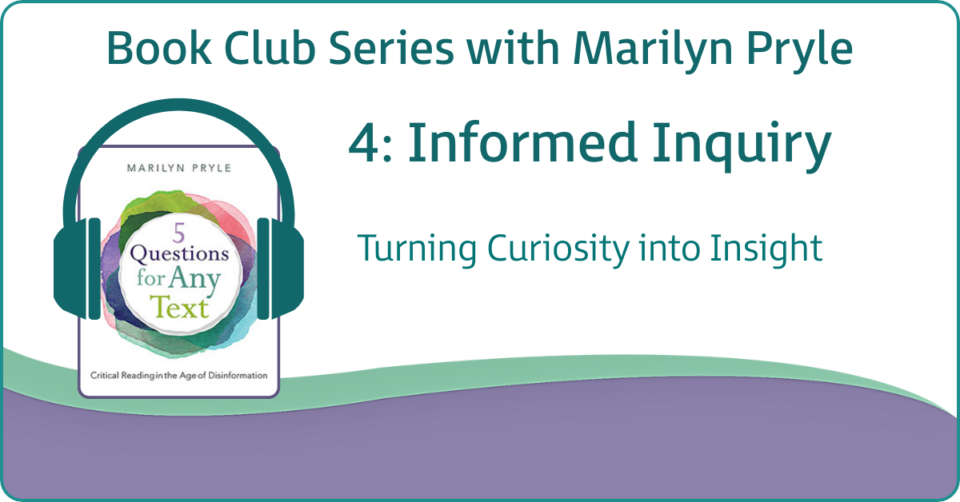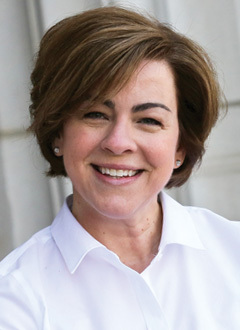
How can we turn student curiosity into meaningful inquiry?
In 5 Questions for Any Text, educator and author Marilyn Pryle shares a practical framework to help students read more critically in today's media-saturated world.
In the final episode of this four-part series, we explore how asking the right questions can lead students to deeper understanding and more thoughtful engagement with texts. You'll hear how students investigate topics like global data privacy and the science behind alchemy using background knowledge, credible sources, and critical thinking to explore these complex ideas.
Marilyn guides these inquiries by encouraging research, inference, and reflection, helping students connect their questions to broader issues in the world and in literature.
Listen in to this excerpt from her audiobook, followed by a reflection and a few prompting questions from Marilyn.
Transcript
Marilyn Pryle (audiobook excerpt):
Readers might think about this category by asking themselves, "If I have a question, do I already know the answer to any part of what I'm asking?" or "Where could I look to find out more? How can I use other sources to answer my question? How can I make sure these sources are reliable?"
Students will always have questions about what they are reading. This category asks them to investigate their questions a bit more deeply. What is their knowledge so far? What can they infer? Where could they do more research? The criteria for completing an RR still apply. The student must include a quote and meet the minimum sentence requirement. Thus, there is room for the student to speculate and investigate and to explain what they already know.
Often, students don't understand how simply asking a question could be a whole RR. To help students practice meeting the criteria, have them practice this category with a partner. Give them a short article or a poem and have the partners generate a question. Then, have them write the RR together, working through the prompt and requirements.
How can you tie this question to a quote? What can you already infer? What background knowledge do you have? Where could you look for more information? Having students practice this together will help them complete inquiry RRs on their own.
Let's listen to a few student reading responses for the informed inquiry category. Here's tenth-grader Reese's response for The Guardian article Why is TikTok Banned from Government Phones and Should the Rest of Us be Worried?
"Lately, there have been endless debates about TikTok and whether or not it poses a threat to the national security of our country. TikTok is banned for government officials in both the UK and the US, but the general public still has access. Is this because data can really be monitored and stored by the Chinese state?
"Alan Woodward of Surrey University says that 'if there is a cybersecurity issue for the government users, the same applies to all of us.'
"TikTok is owned by ByteDance based in Beijing. Because this company is China-based, politicians are worried that Chinese officials could see TikTok's 'users data and source code under Chinese domestic laws, including the National Intelligence Law of 2017.'.
My question is, is it right to ban TikTok? While it is a possible threat for national security, there are three other Chinese-owned apps that seem to be taking the US by storm. Temu, an online retailer, CapCut, a video editing app, and Shein, a fashion company, are all Chinese-owned. If we are going to ban TikTok, it would be interesting to see if these sites would also be banned."
I asked Reese if after reading her article she could answer the question of whether data can be monitored and stored by the Chinese state. Reese touched upon an essential question around globalization and technology. I asked her if she used any of these apps and what the global benefits and drawbacks were.
Here's tenth-grader Gwini's response to The Alchemist by Paulo Coelho and the article, The Secrets of Alchemy by Lawrence Principe.
"My question is about alchemy. As I read, I wondered about this science and whether regular metals could really be turned into gold and silver. I also wondered about the philosopher's stone and whether it was real.
"I used Google to find articles about alchemy. There was one that had a lot of good information in it, The Secrets of Alchemy, on the Science History Institute website. The author believes that alchemy has ties to sciences such as chemistry, medicine, and pharmacy, as well as creative things like art and philosophy.
"There was a part of the article that talked about how the study of alchemy was like trying to improve on nature and 'included the exploration of the relationship of human beings to God and the created universe.' I think Coelho chose an alchemist as the title of the book and the person that helped Santiago in his journey because of this."
I asked Gwini why she thought the Science History Institute was a reliable source. I also asked Gwini to explain her conclusion more. How does Santiago's journey relate to a kind of spiritual alchemy?
Conferring with students. When we're conferring with students, we always begin by responding to them personally. Both Reese and Gwini were invested in their inquiries on an intellectual level rather than a personal or emotional level. Thus, in our conferences, we move directly into developing critical awareness. Once we've responded to the student, we can work on developing critical consciousness.
Reese's topic in question are timely and will remain hotly debated for some time. She effectively explained the background, used a quote, and posed her question. My questions nudged her to tie this specific issue to a larger question around globalization. What are the benefits and risks of living in a globalized world? How can we as a species mitigate the risks while not completely shutting ourselves off from each other? These are the questions she will have to participate in as an adult.
Gwini's question was more informational, and she was able to find an answer online. I commended her for taking that answer a step further by making an inference about the author's intentions. At the same time, I wanted her to articulate that inference more fully. I also had an opportunity to ask her about source reliability. Making that idea a constant part of the discussion will help students habitually ask about it in their minds.
Finally, here's one last question for taking the conversation further. How does my question relate to bigger issues in the world or in the text?
Marilyn (commentary):
I love this category. It's a classic category. It's giving the students space to ask a question, which is so important. A lot of times I've found that students are afraid to raise their hand in front of everybody else and ask the question that they have, so giving them this space in writing really lets them ask. And they know that they will have a quick conference with just me, and so I can answer the question for them, or they'll ask it in their small group. But it creates that safe space to really ask what they're thinking. So I love this category for that.
What I like about this version of it, informed inquiry, is that they have to come to the question with whatever background they can gather from the text, right? So what is the context? What do you understand already? And then ask your question. What will happen?
And of course, the requirements for a reading response in my class are that you get to six sentences. In another class, it might only be four or five sentences. Whatever your parameters are, those still are in place. So a student just can't write one sentence of their question. They have to have those full five or six sentences with it. So a lot of that could be the context, the buildup.
But what I found happens is in the course of writing the reading response, students will answer their own question. And this is so fun, not surprising, because the act of writing is the act of thinking, right? Writing is not just recording thought, it's expanding on your thought. It's creating thought.
So students will start off with little context, ask their question, and then they sort of keep going, and then they answer their question. And when I come to them for that quick reading conference, they'll say, "Oh, I started off with a question, but I already answered it." And I say, "That's great. Tell me about your process. Tell me what happened." And it all still counts.
So just creating that space in the classroom for, number one, allowing them to ask questions, but then allowing them to think through it. And even if they arrive at the answer, they still get credit for the whole process. It's about process. So I love this category for that.
So I would say if you're talking about this in your small group, I would think about, just with yourself and your own experience, how do you ask questions when you're reading or when you're encountering a text? And how do you arrive at answers just yourself? And then to take that a step further, how can you make space in your classroom so that students feel more comfortable asking questions and being wrong in front of each other? This is a huge thing that I have just been dealing with my whole career, creating a space, a culture of trust where the students aren't afraid to be wrong in front of each other. It takes a lot of work.
And a category like this contributes to that when a student realizes, "I can ask a question, and it's not a dumb question." They say that all the time. "I have a question, but it's a dumb question." And we say, "No. No question is never dumb." But really providing the space for them to ask it, and they still get points, and they still get your full attention, these are the things that create that culture of trust.
ABOUT THE AUTHOR

Marilyn Pryle is a National Board Certified Teacher with over 25 years of experience in education. She teaches 10th grade English in Clarks Summit, PA, and is the author of several books for teachers, including 5 Questions for Any Text, Reading with Presence, and 50 Writing Activities for Meeting Higher Standards. Marilyn holds an Ed.D. in Curriculum & Instruction and was the 2020 Pennsylvania Teacher of the Year.


